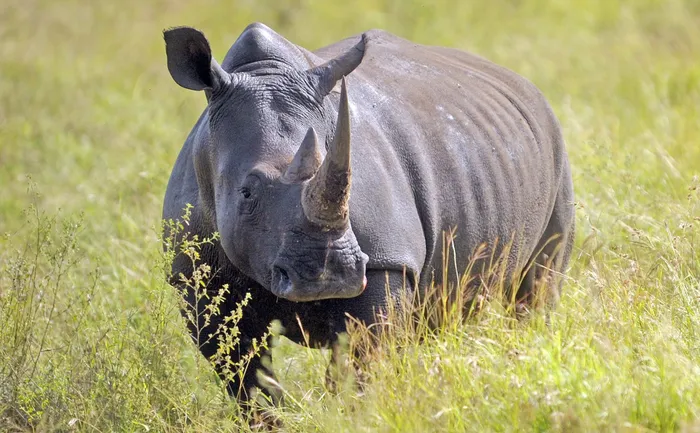
Ezemvelo KZN Wildlife says its Rhino Guardianship Strategy and mass dehorning initiative have cut poaching incidents by 80 percent in Hluhluwe iMfolozi Park, marking a major step forward in South Africa’s fight to protect rhinos.
Image: File
KwaZulu-Natal has recorded a major breakthrough in the fight against rhino poaching, with figures showing a sharp decline in incidents compared to 2023.
Hluhluwe iMfolozi Park in particular has seen an 80% reduction in poaching, marking a significant milestone for conservation efforts.
Ezemvelo KZN Wildlife credited its Rhino Guardianship Strategy and mass dehorning operation as central to the success.
The organisation reaffirmed this commitment on World Rhino Day, saying it was determined to eradicate poaching across its reserves.
The Rhino Guardianship Strategy, launched in August 2024, combines several interventions including intensified patrols, surveillance, boundary fence upgrades, staff integrity testing and dehorning.
A large-scale dehorning programme, rolled out in April 2024, saw 1,071 rhinos dehorned in less than three months.
“We have seen firsthand how dehorning, combined with integrity testing and surveillance technology, can shift the odds in favour of rhino protection,” said Dumisani Zwane, officer in charge of the Game Capture Field Operations at Ezemvelo.
“The scale and precision of our operation at Hluhluwe iMfolozi Park has proven to be highly effective in addressing the scourge of poaching incidents. We are now only down to single monthly digits in poaching incidents, which is a significant turnaround. The work does not stop until poaching is eliminated entirely from our reserves.”
Between 2009 and 2024, Hluhluwe iMfolozi Park lost 40% of its rhino population, contributing to a national peak loss of 1,000 rhinos per year. Dehorning was first introduced in smaller reserves in 2016 and later expanded to Hluhluwe iMfolozi Park in 2024 in partnership with WWF South Africa.
Ezemvelo CEO Sihle Mkhize said the success reflected the scale of collaboration and persistence behind the effort.
“The sharp decline in poaching is a direct result of our relentless collective efforts and bold strategic measures to protect our cherished rhino population. Ezemvelo remains committed to intensifying these efforts, fuelled by optimism for even greater victories in safeguarding our wildlife heritage.”
The strategy rests on three pillars: technology, enhanced operational capacity and improved community relations. More than 100 staff members, including 58 employees at Hluhluwe iMfolozi Park and 55 reserve managers, have undergone independent integrity testing.
Technological reinforcements include an upgraded Automatic Number Plate Recognition camera system, 216 trap cameras, drones, vehicle trackers and helicopters with night vision.
The organisation is also expanding a R40 million smart fence with funding from the Department of Forestry, Fisheries and the Environment.
Operational training has been stepped up, with specialised K9 units, improved reaction teams and the appointment of a dedicated wildlife prosecutor to fast track poaching cases. Community partnerships are also playing a role, with education initiatives and beneficiation projects aimed at empowering local residents.
“Operational strength has been significantly enhanced through advanced, specialised training that sharpens K9 reaction and tracking capabilities. A dedicated wildlife prosecutor now stands at the forefront, tackling wildlife crime cases across the province. Most critically, the strategy pioneers the development of Integrated Wildlife Zone guidelines and drives community projects that empower local residents as vital partners in the fight for conservation,” said Vuyiswa Radebe, Head of Biodiversity Conservation Operations at Ezemvelo.
She added that schools near Hluhluwe iMfolozi Park were invited to take part in World Rhino Day discussions to strengthen community involvement.
Despite the progress, the impact of poaching remains severe. “While these measures have dramatically reduced poaching figures, the fight is far from over. Even a single rhino lost is a tragedy, especially for orphaned calves. A poached mother leaves behind a calf, often too young to survive on its own,” said Zwane.
Ezemvelo’s rhino orphanage and rehabilitation programme has become a critical safety net. “We have recently rescued 11 rhino orphans, some as young as one month, who would never have survived on their own.
These young rhinos are given a second chance. They are nurtured, stabilised, and eventually rewilded into Hluhluwe iMfolozi Park,” he added.
World Rhino Day also coincided with the 21st anniversary of the Black Rhino Range Expansion Project, a partnership between Ezemvelo and WWF South Africa. Since its inception, the initiative has created 12 new conservation sites, protecting more than 245,000 hectares of habitat.
The project has resulted in the birth of 235 calves and the relocation of 244 rhinos, which now represent 40% of KwaZulu-Natal’s total black rhino population. Over R120 million has been raised to support the programme.
The combination of bold conservation strategies, technological advancements and community involvement has given new momentum to the province’s fight against rhino poaching.
On World Rhino Day, Ezemvelo said it would continue to push forward until every reserve was free from poaching.
BUSINESS REPORT